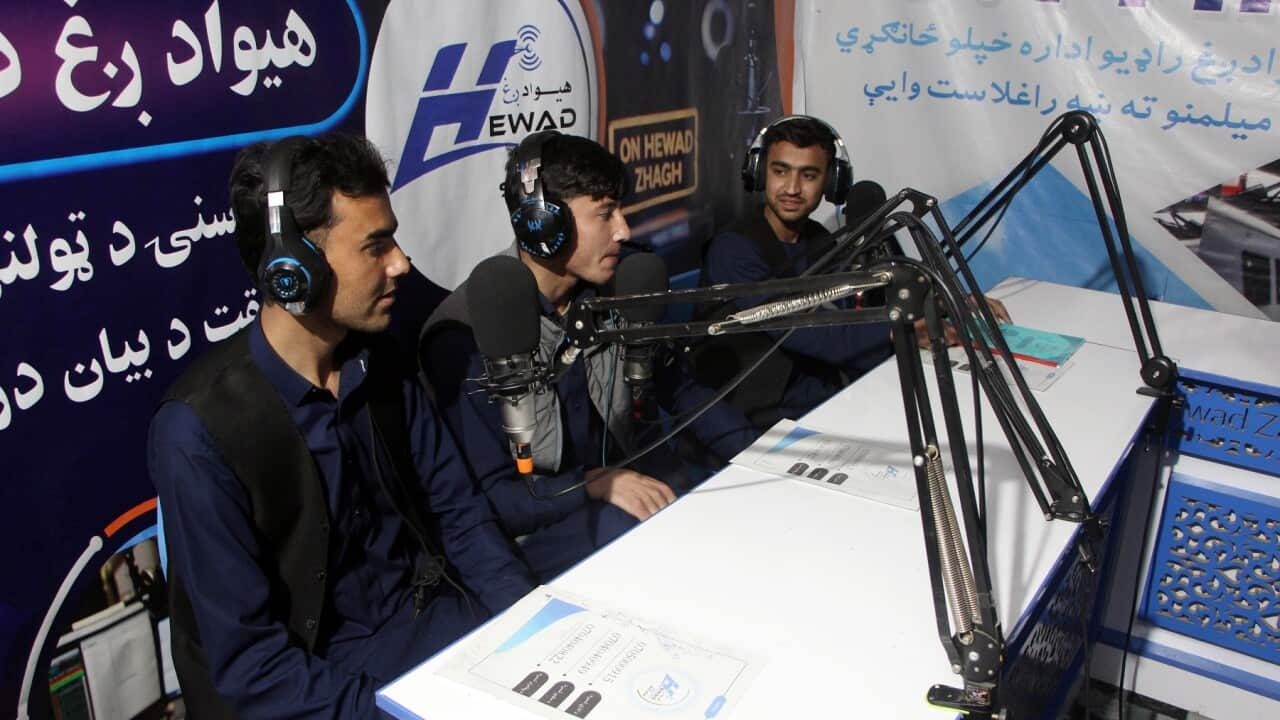Listen to Australian and world news, and follow trending topics with SBS News Podcasts.
TRANSCRIPT:
This story contains references to sexual violence and mass killings.
Musab Hassan, a survivor of these massacres, says the conviction gives his people hope that justice will come for all the perpetrators.
For Musab Hassan, he will never forget the morning his Sudanese village was raided and burned to ash by a militia group known as the Janjaweed.
"I was nine years old when early morning, like any other morning, we woke up to freshen up and go to school when these militants attacked our village. These militants were attacking us from the ground and the Sudanese air forces were bombarding the villages from the air. I lost two siblings, an uncle, dozens of them from my family and relatives. Suddenly we found ourselves was nothing but people fleeing and spent several months fleeing from one place to another, just looking to survive."
Starting in 2003, a five year campaign by militia groups and the Sudanese military in their western region of Darfur saw around 300,000 killed, according to UN estimates, and about 2.7 million forced from their homes.
And it's the survivors of the Darfur massacres in the early-to-mid 2000s, labelled the 21st Century's first genocide by former US Secretary of State Colin Powell, that are now celebrating an historic day.
"The Chamber is convinced that the accused is guilty beyond reasonable doubt of the crimes with which he has been charged. Its verdicts are unanimous. Stand up, please, Ali Muhammad Ali Abd–Al-Rahman."
That's Judge Joanna Korner of the International Criminal Court reading a verdict, convicting infamous militia leader Ali Muhammad Ali Abd-Al-Rahman for his role in the mass killings 20 years after the fact.
The court has found the former leader of the Janjaweed militia guilty of 27 counts of crimes against humanity and war crimes, including rape, murder and persecution, for his actions between in 2003 and 2004.
The court heard harrowing testimony from survivors describing massacres, sexual violence and torture carried out under his command.
"The accused ordered some of the detainees to get out of the vehicles. He then ordered the detainees to lie down in a line and then instructed the Janjaweed and the government of Sudan forces to shoot and kill the detainees. As demonstrated by the facts relating to the crimes, the accused encouraged and gave instructions that resulted in the killings, the rapes and destruction committed by the Janjaweed in Kuntum and Bindizi."
The ICC verdict marks the very first time that one of the architects of the years-long campaign of atrocities has faced justice, with the court still seeking a conviction of Sudan's former dictator Omar al-Bashir on charges including genocide and crimes against humanity.
Seif Magango, a spokesman for the UN, says they welcome the verdict.
"The convictions by a Trial Chamber of the International Criminal Court represent an important acknowledgment of the enormous suffering endured by the victims of his heinous crimes, as well as a first measure of long overdue redress for them."
So what was the reason for this devastating military campaign?
In 2003, Darfuri rebel groups took up arms against the Sudanese government in protest over what they saw as an unequal distribution of economic resources.
The ensuing conflict saw Sudanese government forces - led by autocratic President Omar Al-Bashir - as well as his allied Arab militia group, storm the region, raiding villages of the Zaghawa, Masalit and Fur tribes which they saw as linked to rebel groups.
Musab Hassan, who now lives in Sydney and is president of the Sudanese Zaghawa Community Association of New South Wales and Canberra, says the armed forces spared no one.
"It's an absolute eradication of entire communities, entire nation, from their villages, from their cities, from their farms, and killing the people just based on their ethnicity. Al-Bashir, he gave them absolute impunity and rights and guns and support to eradicate and kill and genocide African tribes. They killed and kidnapped and burned and raped entire villages, almost 3000 villages."
Now, one of the architects of these crimes, Mr Abd-Al-Rahman faces a possible life sentence, which will be determined at a later date after a new round of ICC hearings.
The verdict has been a bittersweet moment for survivors whose families and communities are once again the target of militants descended from Mr Abd-Al-Rahman's Janjaweed, a paramilitary group known as the Rapid Support Forces.
"Today’s verdicts - unfortunately come at a time when similar atrocity crimes are taking place once again in Darfur, and elsewhere in Sudan, amid the ongoing conflict between the Sudanese army and Rapid Support Forces."
The RSF has been in a civil war with the Sudanese Armed Forces since April of 2023, a conflict that has created the largest current humanitarian crisis in the world with around 13 million displaced and, according to US estimates, over 150,000 are believed to have been killed.
In Darfur, famine has been declared in several areas and hundreds of acts of sexual violence and ethnically-targeted killings of Masalit, Fur and Zaghawa people by the RSF has been labelled a genocide by the United States and several human rights groups.
Musab Hassan says the ICC outcome gives his people hope that those militants who have devastated their community both 20 years ago and today will someday be brought to justice.
"I felt it is a very historic day. This is a sign for us. It's a small light at the end of the tunnel for the survivors of the genocide. And of course, for those who are still going through the genocide in Darfur, they will remember that the justice and accountability will never be forgotten. There is a saying in Sudan that justice will come sooner or later, but will never be forgotten. Whenever criminals in the world have impunity to do war crimes and genocide and walk away, the world will not be safe."
If you or someone you know is impacted by sexual assault, call 1800RESPECT on 1800 737 732, text 0458 737 732, or visit 1800RESPECT.org.au. In an emergency, call 000.













